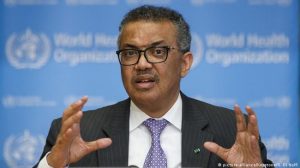The World Health Organisation (WHO) said cases of the infectious viral disease mpox are on the rise around the world, adding that it has convened its Emergency Committee to discuss the outbreak.

The WHO reported this on Tuesday, August 13, 2024, from Geneva Switzerland.
Confirmed cases of the disease, formerly known as monkeypox, declined slightly in June to 934 from 963 in May, but the WHO is assuming incidence is probably higher, as not all cases are being recorded and testing has declined.
The committee is to discuss the spread of a new clade, or variant, on Wednesday as they deliberate on whether a Public Health Emergency of International Concern (PHEIC) should be declared.
Emergencies of this kind were declared in 2020 in response to the Coronavirus pandemic and in 2022 on account of an earlier mpox outbreak.
The aim is to alert health authorities to a rise in cases.
Mpox can cause a rash and can be dangerous for children, pregnant women and those with suppressed immune systems.
In June, 100 cases were recorded in Europe, 175 in the Americas and 567 in Africa, where 96 per cent of the cases were in the Democratic Republic of Congo.
The lack of testing meant that only a quarter of suspect cases were tested, with two thirds of the tests being positive.
“The confirmed case counts are, therefore, underestimates of the true burden,” the WHO said.
Full data are available only to the end of June, since when mpox cases have for the first time been reported from four more African countries: Burundi, Kenya, Rwanda and Uganda.
Since the beginning of 2022, 99,176 confirmed cases from 116 countries have been reported to the WHO up to the end of June, with 208 people dying from the disease.
The WHO assesses the risk of infection with the clades I and II of the viruses as high in parts of the Democratic Republic of Congo.
A new variant was found there in 2023 that could be more infectious.
